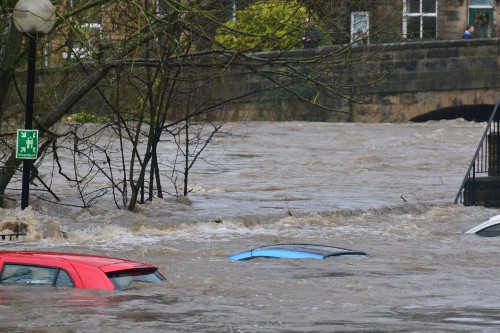
A new project co-led by the University of Bristol, aims to improve future flood adaptation measures in the UK, providing better-targeted protection against the impact of climate change.
By cutting the time and cost involved in running computer models of projected flooding out to the year 2100, the £1.2 million, three-year initiative will enable detailed assessment of a much wider range of potential scenarios than currently possible.
This will aid construction of flood adaptation measures much better matched to the specific needs of different parts of the UK. Flood adaptation can include not only the construction of physical flood protection measures but also a range of other options such as early warning systems, risk-informed land planning and nature-based solutions.
The project is led by the Universities of Bristol and Edinburgh, and the UK Centre for Ecology and Hydrology, and is supported by the UKRI Engineering and Physical Sciences Research Council (EPSRC) and Natural Environment Research Council (NERC).
Bristol lead Paul Bates, Professor of Hydrology at Bristol's Cabot Institute for the Environment and co-founder of water risk intelligence firm Fathom, said: "This project is an important step towards better decision making in flood risk management. Since all models are forecasts, based on available evidence, both scientists and the government need robust ways to evaluate the impact of these uncertainties on the advice they provide."
The Environment Agency, the Scottish Environment Protection Agency (SEPA), Arup, Fathom and Kaya Consulting are partners in the initiative.
The new project was announced alongside a new Floods and Droughts Research Infrastructure, led by NERC and the UK Centre for Ecology and Hydrology and backed by a £40 million investment.
Computer models play a key role in informing the design of flood adaptation measures.
By highlighting how rain and river flows work their way through urban and rural landscapes, they make it possible to evaluate the extent of potential flood inundation caused by extreme weather events.
Currently, to project future changes to flood inundations, models relied on by engineers use historic data of river flows and water levels, plus allowances made for the effects of climate change.
This simple approach to the inclusion of climate change influences on river flows can increase the risk of schemes being under- or overdesigned.
Moreover, the flood models require a lot of computing power and can be slow to run.
Due to time and cost constraints, a model can often only be run a few times – nowhere near enough to factor-in all the uncertainties surrounding the nature, extent and impact of a potential extreme weather event.
Similarly, there is limited scope to take account of how factors such as local land use, soils and catchment shape will affect a flood's behaviour and severity.
Building on capabilities generated through decades of support from the EPSRC and NERC, the new research aims to eliminate these limitations.
It will develop new algorithms enabling flood models to run much more quickly; this will make it practical and affordable to conduct hundreds of runs which take account of multiple parameters and possibilities.
It will also integrate best-available climate change projections to further enhance models' robustness.
Another benefit will be the ability to dovetail 'big picture' regional-scale modelling with fine-scale local modelling, boosting understanding of risks which can differ widely across the country.
More than six million people in the UK, plus a host of critical road, rail, electricity, health and other infrastructure, are currently exposed to the risk of river, coastal, surface water and other flooding.
In the context of a changing climate, this figure will reach an estimated 11 million by 2080.
The effects are already being felt: some parts of the country have experienced 'once-in-200-years' flood events three times in the past decade.
It is of vital importance to ensure every pound invested in increasing resilience to flooding is spent wisely and effectively.
Professor Charlotte Deane, EPSRC Executive Chair, said: "As the climate changes, the UK needs practical responses to the growing threat of flooding.
"This new project will help deliver affordable, accessible, usable modelling tools that enable government and industry to work together to achieve better flood protection sustainably and cost-effectively."
Project lead Professor Lindsay Beevers, Established Chair in Environmental Engineering, School of Engineering at the University of Edinburgh, said: "UKRI's support has enabled us to develop an understanding of how to use models to address uncertainties inherent in both flood and drought prediction.
"This is crucial to modelling flooding events successfully, especially in view of both the multiplicity and the cascading nature of their direct and indirect impacts.
"We want to encourage a new approach and fresh mindset capable of meeting the challenges of flood adaptation across the UK in the decades ahead."






